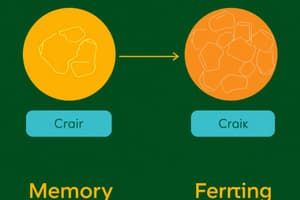Podcast
Questions and Answers
Which factor can affect memory function according to the text?
Which factor can affect memory function according to the text?
- Social media usage
- Context (correct)
- Physical strength
- Emotional intelligence
What techniques are mentioned to enhance memory retention and recall?
What techniques are mentioned to enhance memory retention and recall?
- Skipping sleep
- Random memorization
- Mindless repetition
- Spaced repetition (correct)
Which brain structures are associated with memory, as per the text?
Which brain structures are associated with memory, as per the text?
- Temporal lobe and brain stem
- Parietal lobe and amygdala
- Hippocampus and prefrontal cortex (correct)
- Cerebellum and occipital lobe
What can lead to difficulties in encoding, storing, or retrieving information?
What can lead to difficulties in encoding, storing, or retrieving information?
How can ageing affect memory function?
How can ageing affect memory function?
What is a potential therapeutic intervention for memory impairments based on the text?
What is a potential therapeutic intervention for memory impairments based on the text?
What is the initial stage of memory processing that holds brief sensations from various senses?
What is the initial stage of memory processing that holds brief sensations from various senses?
Which type of memory has a limited capacity of approximately 7±2 items and lasts for seconds or minutes?
Which type of memory has a limited capacity of approximately 7±2 items and lasts for seconds or minutes?
What type of memory stores large amounts of information over extended periods, ranging from hours to years?
What type of memory stores large amounts of information over extended periods, ranging from hours to years?
Which type of memory involves habituation, priming, classical conditioning, and perceptual learning?
Which type of memory involves habituation, priming, classical conditioning, and perceptual learning?
What is the temporary storage that allows us to register fleeting experiences before they fade away completely?
What is the temporary storage that allows us to register fleeting experiences before they fade away completely?
Which memory type serves as a mental workspace where we temporarily hold and manipulate information while performing tasks?
Which memory type serves as a mental workspace where we temporarily hold and manipulate information while performing tasks?
Flashcards are hidden until you start studying
Study Notes
Memory is a fundamental cognitive process that involves the encoding, storage, retrieval, and manipulation of information. It plays a crucial role in our daily lives, allowing us to remember past events, learn new skills, and recall important facts. There are several types of memory, each with its unique characteristics and functions:
Sensory Memory
Sensory memory is the initial stage of memory processing. It holds brief sensations from various senses, such as visual images, sounds, smells, tastes, and tactile stimuli. This temporary storage allows us to register these fleeting experiences before they fade away completely.
Short-Term Memory (STM)
Short-term memory, also known as working memory, has a limited capacity of approximately 7±2 items and lasts only for seconds or minutes. STM serves as a mental workspace where we temporarily hold and manipulate information while performing tasks like reading, listening, and solving problems.
Long-Term Memory (LTM)
Long-term memory stores large amounts of information over extended periods, ranging from hours to years. LTM can be further divided into declarative (explicit) memory, which includes episodic memory (events), semantic memory (facts and concepts), and procedural memory (skills). Another type is nondeclarative (implicit) memory, which includes habituation, priming, classical conditioning, and perceptual learning.
Memory is influenced by various factors, including attention, motivation, context, emotional arousal, and sleep quality. Ageing and certain neurological conditions can affect memory function, leading to difficulties in encoding, storing, or retrieving information.
Research on memory continues to advance our understanding of this vital cognitive process. Techniques like spaced repetition, mnemonics, and memory palace methods help enhance memory retention and recall. Additionally, understanding the neural basis of memory and its associated brain structures, such as the hippocampus and prefrontal cortex, has led to the development of potential therapeutic interventions for memory impairments.
In conclusion, memory is a complex and multifaceted cognitive process that underpins various aspects of our lives. Its different types and functions enable us to learn, adapt, and remember the world around us. As science continues to unravel the mysteries of memory, we gain valuable insights into how to improve our memory abilities and support those facing memory-related challenges.
Studying That Suits You
Use AI to generate personalized quizzes and flashcards to suit your learning preferences.



